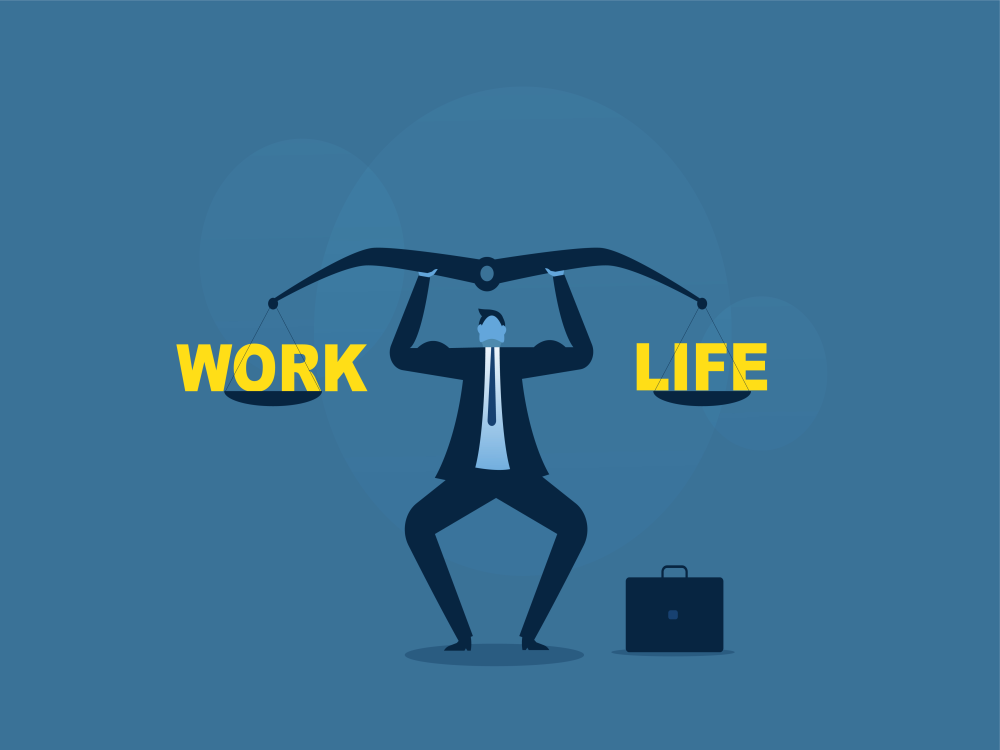What is work-life balance?
Work-life balance refers to the equilibrium between a person’s work commitments and personal life, including family, leisure, and self-care. It is the ability to effectively manage the demands of one’s professional responsibilities while devoting time and energy to activities and relationships outside of work.
It is essential because it affects an individual’s physical and mental well-being. Maintaining a healthy work-life balance can help prevent burnout, improve work performance, reduce stress and anxiety levels, and increase overall life satisfaction. Finding the perfect balance can be challenging, but it is essential for leading a fulfilling life.
Why a healthy life-balance is important?
1-Improved mental and physical health:
Improved mental and physical health: Long-term stress can impact your mental and physical well-being and result in health problems such as depression, anxiety, heart disease, and high blood pressure. Achieving balance in your life can provide you with the opportunity to concentrate on yourself and lower the chances of developing these diseases.
2-Lower risk of workplace burnout:
Many individuals report experiencing burnout in the workplace, with a recent study indicating that 77% of workers feel this way. This can have a negative impact on both one’s personal life and work performance. To lower the risk of burnout, it is important to find a balance between work tasks and personal responsibilities.
Related:16 Tips To Avoid Employee Burnout for You and Your Staff
Related: How to Avoid Burnout?
3-Enhanced relationships:
Maintaining a healthy work-life balance allows for quality time to be spent on relationships with family, friends, and loved ones. Building and nurturing strong connections strengthens a support system, increases happiness, and fosters a sense of belonging.
Related:10 Tips to Maintain Lasting and Strong Friendships
Related:12 Signs Of An Unhealthy Relationship
4-Happiness and satisfaction:
Achieving a balance between one’s work and personal life leads to greater overall happiness and satisfaction. You have the freedom and flexibility to enjoy a variety of experiences, pursue personal goals, and cultivate a well-rounded and fulfilling life.
Related:8 Quick And Easy Ways To Feel Happier
Related:10 Things That Happen When You Start to Enjoy Being Alone
5-Personal growth and fulfillment:
Achieving the balance between one’s work and personal interests is an effective means of promoting personal growth and fulfillment. Engaging in hobbies, learning new things, and pursuing passions outside of work can provide a sense of accomplishment and allow individuals to explore their talents and interests, ultimately contributing to their overall sense of purpose and fulfillment in life.
Related:12 Ways to Cultivate a Growth Mindset for Self-Improvement
6-Increase productivity:
Spending extra hours at work or bringing work home with you may seem like a way to increase your productivity, but the reality is that you may be doing more harm than good.
Studies show that taking breaks can be more beneficial. This is because breaks can help improve focus and reduce anxiety, both of which can result in higher productivity and better quality work.
Related: Top 34 Productivity Hacks to Boost Productivity in 2023
Related: What Is Toxic Productivity? 13 Signs & Tips To Overcome It
19 tips to improve your work-life balance:
1-Set realistic goals:
Achieving a healthy work-life balance begins with understanding what the ideal balance means to you. Take a close look at your current work and personal schedules and identify areas where they overlap or interfere with each other. Use this information to create an overall plan to meet all your responsibilities without interference.
Related: How To Set Goals and Achieve Them?
2-Know your:
Take some time to ponder what matters most to you in life. How much of your time is devoted to your top priorities? Think about your interests and hobbies, and ensure that you set aside time for activities that bring you joy and vitality.
Related: How Hobbies Improve Your Life?
Related:10 Ways To Find Joy In The Little Things
3-Prioritize and delegate:
Identify your priorities and concentrate on the most significant responsibilities. Reduce your workload by assigning responsibilities whenever possible. Practice turning down non-essential tasks that may be overwhelming.
4-Set boundaries:
Be sure to create a distinction between your work and personal life. Define specific working hours and make every effort to stick to them. avoid checking work-related emails or doing tasks outside your designated hours.
Related: Why Is Saying ‘No’ So Important?
5-Improve communication:
To enhance work-life balance, it is necessary to boost communication with employers, co-workers, friends, and family members. It is essential to decline requests when necessary and commit only when confident in one’s ability to follow through to avoid frustration due to miscommunications and broken promises. Additionally, it is important to ask for assistance when necessary and reschedule appointments if feeling overwhelmed.
6-Create a routine:
Make a routine that includes time for work, relaxation, family, friends, and self-care. Having a consistent schedule is crucial for managing your time effectively and decreasing the chances of work spilling over into your personal life.
Related:13 Tips To Create an Effective Daily Routine
Related:13 Tips for a Productive Morning Routine
7-Separate your workspace:
To maintain a healthy work-life balance while working remotely, it is important to create a designated workspace that is separate from your living area. This physical separation can help establish a clear boundary between work and personal life, making it easier to switch off from work mentally.
8-Avoid multitasking:
Avoiding multitasking is recommended as it has been found to cause increased stress and decreased productivity. A more effective approach is to focus on one task at a time and give it your full attention. This allows for more efficient completion of tasks and a clearer separation between work and personal life.
9-Enjoy your work:
Do what you love and love what you do, pursue your passions, and find fulfillment in the work you do.
If your job is making you miserable, it might be time to start looking for a new one. You deserve to be happy and fulfilled in your career, after all. Do not let fear hold you back from exploring new opportunities and taking risks.
Related:10 Tips for Finding a Job You’ll Love
Related: How Upskilling Can Increase Your Career?
10-Unplug from technology:
Choose specific moments throughout the day to disconnect from electronic devices, such as smartphones or laptops. Engage in activities that promote relaxation and bonding with loved ones, such as reading, working out, or spending quality time together.
11-Effective Planning:
Planning daily activities at work is another effective way to maintain a healthy work-life balance. It allows individuals to prioritize their actions based on task importance.
In addition, following a well-crafted plan can help individuals save a lot of time at work. This can allow them to focus on activities outside of work or take a break to rejuvenate themselves.
Related: How To Plan Your Day?
12-‘No Work from Home’ policy:
In many cases, employees bring their work home to meet deadlines. The inability to separate work and home is a significant issue resulting from the heavy workload placed on employees. Working during off-hours can interfere with the necessary rest required by the human body.
In addition, it criticizes the social life of individuals, which is essential for a healthy mindset.
13-Time Management:
Effective time management is crucial to achieving a healthy work-life balance. Unfortunately, many people fail to prioritize this aspect of their lives, leading to an overwhelming workload and little time for personal pursuits. It is therefore essential to establish a daily routine that includes time management strategies such as the Pomodoro technique.
Related: 13 Ways To Boost Your Time Management Skills
Related: The Effects of Poor Time Management Skills
14-Nurture relationships:
Positive relationships and social support are essential for building resilience and coping with stress and burnout. It is imperative to prioritize time with family, friends, neighbors, and loved ones. Engaging in activities together, having meaningful conversations, and actively participating in events or gatherings that foster connections can be of great help.
15-Have downtime:
Taking breaks is equally important for achieving success because it revitalizes your energy. Plan regular time away each week to read a book, participate in sports, spend time outdoors, or simply relax. Choose any activity that you enjoy.
Related:20 Things To Do In Your Free Time
16-Use your lunch break:
If you have a lunch break at your workplace, it is your right to utilize it. This implies that you should not be expected to always consume your meals at your work desk while working through lunch. You can use this time to mindfully enjoy your meal. Additionally, you can perform short meditations or breathing exercises if you experience high stress levels or chronic stress.
17-Practice self-compassion & avoid perfection:
To achieve a sense of balance between work and life, it is imperative to relinquish the need for perfection.
Perfectionism may have been beneficial in our academic and early career pursuits, but it results in accumulating stress over time. Our system and emotional resources become more strained as our responsibilities increase. To achieve a balance between work and life, we must let go of the need for perfection.
It is important to understand that life does not always follow a smooth path. Everyone has their struggles, and you may not always succeed. By acknowledging this truth, you can adopt a more compassionate and growth-oriented approach to work and life, promoting a sense of balance.
Related:10 Ways to Overcome Perfectionism
18-Encouraging a Healthy Lifestyle:
Maintaining a healthy lifestyle is an essential component of achieving a healthy work-life balance. Healthy employees are a valuable asset to any organization, while an unhealthy work-life balance can lead to physical and mental health issues that can significantly impact productivity. Encouraging employees to adopt a healthy lifestyle can help to mitigate these risks.
Related:12 Ways To Add More Variety To Your Routine+lifestyle
19-Reflect, refine, repeat:
Whatever steps you choose to take to establish a good balance between work and life, it is important to keep in mind that you will most likely need to continue refining it over time. Major life changes can be a slow process, so it is advisable to reflect on your approach and make adjustments as necessary to stay on track.








